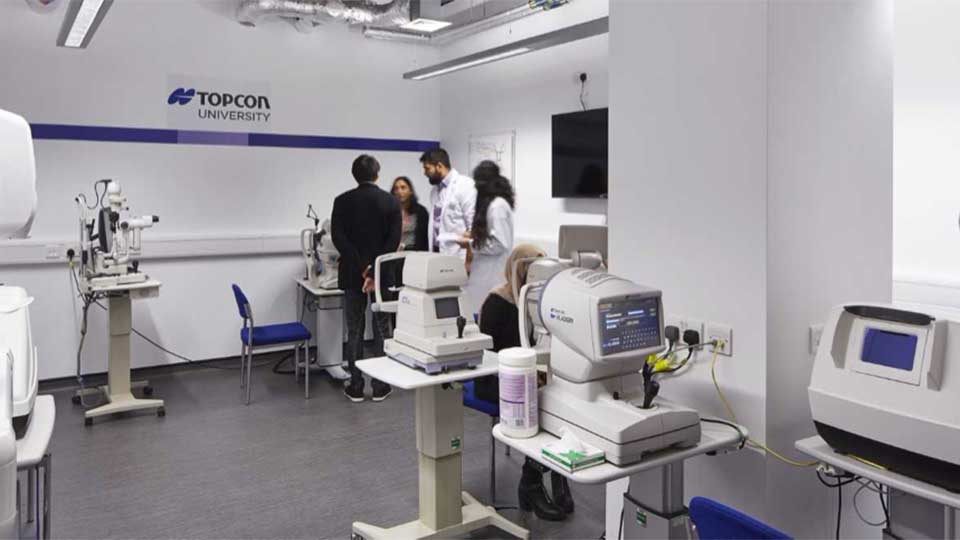- OT
- Life in practice
- Practitioner stories
- I could not live without...City Sight
I could not live without…
I could not live without...City Sight
Ali Yasen, an optometry undergraduate and AOP student Councillor, shares why the eye clinic at City, University of London is so important for his learning

28 February 2018
As a final year optometry student at City, University of London, one of my key concerns is preparation for the pre-registration year and attaining a set number of ’safe’ patient episodes.
To support and prepare us for this final hurdle to qualification, the final year of study has a large focus on clinic time. Therefore, the university’s clinic, City Sight, is a highly valuable resource to me.
The first time
I remember my first time walking into City Sight dressed as a clinician, ready to test my first patient. I remember my peers and I nervously glancing at each other before collecting the ‘real’ patient – one who was expecting a legitimate sight test and was not our fellow lab partner. However, the clinic has such a brilliant set up and was well-equipped to help calm our nerves in the form of one lovely supervisor for each pair of students, as well as a variety of diagnostic equipment.
City Sight boasts 23 testing cubicles with state-of-the-art equipment, including phoropters and electronic testing charts; and four diagnostic suites, containing Humphreys field analysers, Henson 8000s, Topcon TRK-2Ps and NIDEK NT-3000s, as well as Topcon ALADDINs, an Optomap and optical coherence tomography (OCT) facilities.
As a result, students get to practise on a wide range of commercially available testing equipment and become familiar and competent with a variety of tests, putting us in good stead for the working world.
We are also taught how to analyse the data that is produced by some of the newer technology, such as OCT, giving us a unique advantage as prospective clinicians.

Clinic variety
A recent relocation of the clinic to one of our most-frequented university buildings decreases impact on study time for students, whilst still being accessible to the public at street level.
Additionally, the world-renowned Moorfields Eye Hospital is only a stone’s throw away. This gives students the fantastic opportunity of visiting the clinics and theatres at the hospital, exposing us to all manner of pathology and surgical procedures – and allows us to build our knowledge of our involvement with secondary care.
We are very privileged to benefit from contracts with the London Fire Brigade and Camden Paediatrics. This provides us with a diverse testing and dispensing experience; from babies to firefighters and their specific visual requirements.
"I remember my first time walking into City Sight dressed as a clinician, ready to test my first patient. I remember my peers and I nervously glancing at each other before collecting the 'real' patient"
One of my favourite clinics is binocular vision and paediatrics where we are challenged to truly consider the tests we are performing and adapt them to the individual. This is backed up with expertise from both optometrists and orthoptists who we can learn from, as well as support from the dispensary of skilled dispensing opticians; one of whom specialises in paediatrics.
In our contact lenses clinics, we have the advantage of using two types of keratometer, as well as corneal topography, providing us with a technical edge. We again have a wide experience base to draw knowledge from, through a mix of optometrists and contact lens opticians – including an RGP expert who even allows us to practise scleral fittings.
Going paperless
Further echoing recent changes in the optics world, we have shifted towards paperless patient records through the use of i-Clarity. This means records are less likely to be lost or misinterpreted, improving continued patient care.
Upon completion of each patient episode, we build on our learning through an online program, MyProgress, which we can access both on desktop and via an app and allows us to record reflection logs. This has really helped students to consolidate their knowledge on a regular basis, meaning that we face each and every episode with more competence and confidence.
As a result, there has been a real turnaround in both mine and my cohort’s attitude to our clinic time. We now genuinely look forward to the next opportunity to see a patient and develop our skills. I could not think of any better preparation for the next step of our careers in a field that we now feel a part of, and capable of contributing towards.


Comments (0)
You must be logged in to join the discussion. Log in